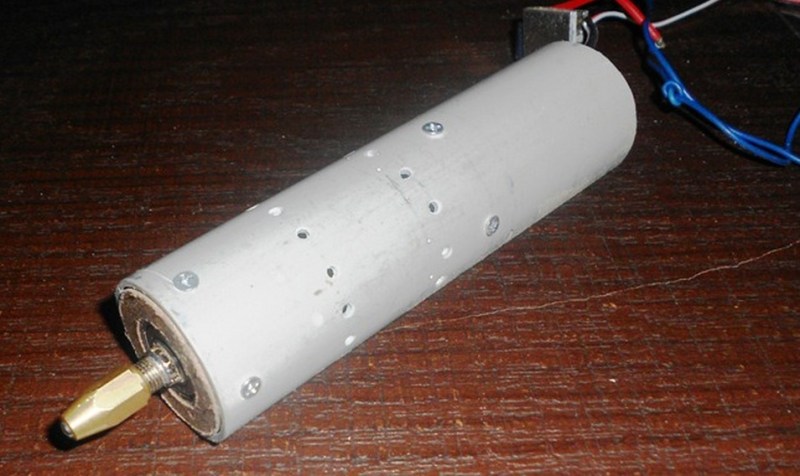[Shashank] has a modest tool collection but is missing a rotary tool. He needed one for a project he was working on but didn’t think that it would get much use after the current project was completed. So instead of buying a rotary tool, he decided to make one to get the job done.
The project started out with a 40mm PVC pipe that would serve a the main body of the tool. Two MDF disks were cut to fit inside the pipe. One was used for mounting an RC vehicle brushless motor and the other was bored out to accept a pair of bearings. The bearings supported a modified pin vise that acts as the chuck for securing rotary tool bits. A 20-amp ESC and a servo tester control the motor’s speed and can get the motor up to 18,000 rpm.
Although this worked for a while, [Shashank] admits it did fall apart after about 20 hours of use. The MDF bearing mounts crumbled, thought to be a result of vibration due to mis-assignment between the motor and pin vise. He suggests using aluminum for the bearing mounts and a flexible coupling to connect the motor to the pin vise. If you’re interested in making your own rotary tool but don’t have any spare motors kicking around, this 3D printed vacuum-powered rotary tool may be for you.
















I like this project becuase it looks half descently safe.
Dremels are such an antiquated design. In the right case and all that, it needs to be on the market.
I was thinking the wide barrel might be tiresome to use. Wonder if a pistol-grip might help?
Actually, the modern Dremel tools are nothing at all like their “antiquated” predecessors. Vintage Dremel tools are vastly superior to what is available today.
Care to elaborate?
Part of having a tool collection is obtaining things that you feel will be useful now and in the future.
I can buy (I have more than one) a rotary tool for under $15 that does a good enough job. If I used it every day, I’d buy a better one.
Why would you spend the time building one, sub standard (20 hours MTBF) when it would take less time and probably cost to buy one in most of the western world ?
I bet you are also counting your value when you are sitting on the toilet too.
Can not imagine how badly it may feel, that you basically loose money while you are “idling”.
Why do people try to rationalize hacks? Only needing a rotary tool for one project is not a reason to go through all the trouble of building one. It’s a reason to buy one for ten dollars at Harbor Freight. Just admit it was idle curiosity. (And if it wasn’t idle curiosity, learn the value of your own time.)
Not giving your money to harbor freight is a valid rationalization.
There is nothing wrong with Harbor Freight tools, except for those that are orange or contain a motor.
I didn’t check out where the builder lives, but I’ve seen here on HaD and other places that South Africans do not have cheap imported anything…
Exactly. The rationalizations for these hacks often sound like solutions looking for a problem.
While the hacker’s rational may be called in to question by some (hmm, perhaps they live somewhere else where such things are not readily available), I have to admit I’ve thought about something like this as a route to create a cheaper, high-accuracy tool (a lot of the cheap import ones seem to suffer from run-out).
Now, I’m not sure if I’d use an RC motor as the drive source (running through a thrust bearing to take the load from the tool) or attempt to upgrade an existing device. As I’ve not really looked into either option, it’s interesting to see someone getting reasonable success with an RC motor.
Big Lots has them as well as Wally World for $10 ‘merican day and night. I would have just modified one of those to last more than a day ha. Otherwise I actually like his build as it would act as a nice test ground for modifying one of those. Keep on making things shashank.
It lasted 20 hours? That’s considerably longer than an actual Dremel branded tool lasted for me!
I told it to do that.
Hackaday has featured DIY precision spindles using RC BLDC motors before. Of course the precision aspect needed the builder to invest more effort than a quick hack.
http://hackaday.com/2014/08/03/brushless-dc-motor-used-for-high-speed-cnc-spindle/
The only thing that deters me from using an RC BLDC + ESC is they are not designed for the duty cycle that might be encountered in a CNC. It might be just fine if run at maybe 50% of the current rating.